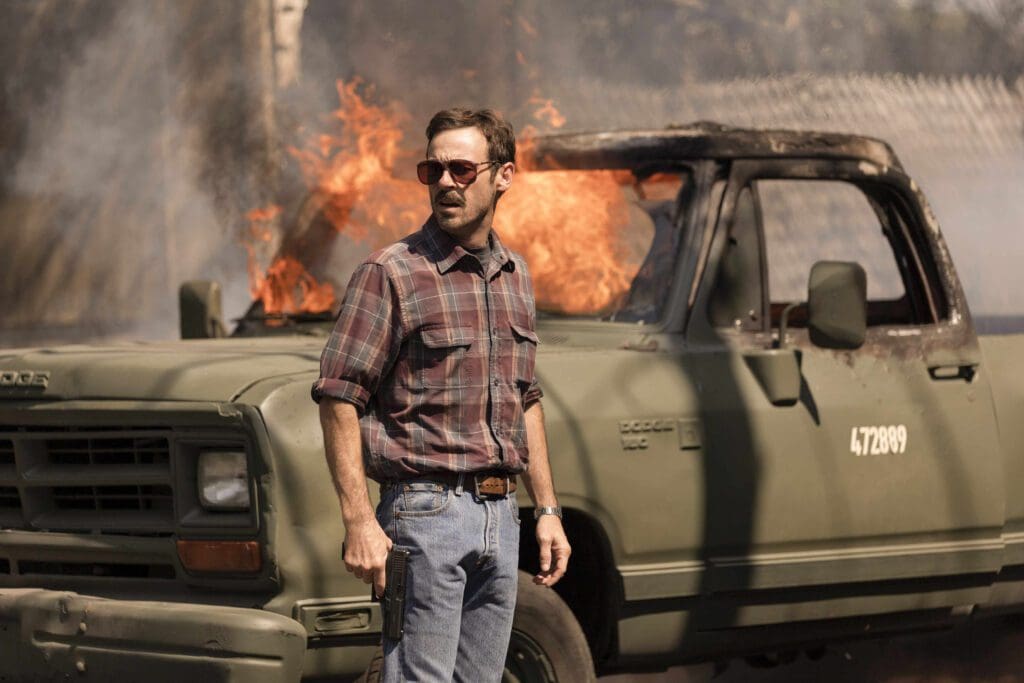Summary
The final season of Narcos: Mexico proves that the series remains the most cinematic show on television no matter the iteration.
This review of Netflix’s Narcos: Mexico season 3 does not contain spoilers.
The final chapter in Narcos: Mexico is an explosive finale to one of the more underappreciated series. Whatever iteration of Narcos you have watched, you are absorbed in a world that takes you to another time and a very violent place. No matter the iteration, Narcos has and may always be that cinematic show on television, broadcast, or streaming.
The explosion of the cocaine trade in Mexico and into the world’s most significant market — America. After the arrest of Felix in season two, splinter wars have broken out all over Mexico. The Arellano family still has control of Tijuana, led by Benjamin (Alfonso Dosal), Enedina (Mayra Hermosillo), and hot head, Ramon (Manuel Masalva). The Tijuana Cartel (also known as the AFO) is by far the most powerful. They are strategically working to funnel money into legit businesses with the help of Carlos Hank (Manuel Uriza), a political animal. He helps finance any man he wants to become Mexico’s next president. You have the Juarez Cartel, led by Amado (a magnetic Jose Maria Yazpik), known as the Lord of Skies. He flies his product over the borders and, if you remember, is the man Felix said at the end of season two could be the most significant trafficker in the world.
Oh, there’s more. The series also has Sinaloa Cartel looking for a border of their own, including El Chapo (Alejandro Edda). They want help from Mayo to use his shrimping ships. Everyone wants their piece of the pie. Still there to take them down is Walt (Scoot McNairy) of the DEA, who cut off the head of a powerful cartel only to see several that popped up in Felix’s place. Tracking the story is the only honest paper in town — the La Voz. The owner Roman (Alejandro Furth), is so ethical and dedicated to following the truth. He gets his issues printed in San Diego instead of Tijuana printing presses. His young reporter, Andrea (a wonderful Luisa Rubino), begins to follow a story of respected families and businesses entering holy matrimony with the Arellano family.
Narcos and Narcos: Mexico were created by Carlos Bernard. Along with the help of Mexico director and writer Andres Biaz, they have created a violent, immersive, and deeply rich world no one wants to enter. Still, many want to watch from a distance (that’s something Scorsese has made a career out of). Each episode is a chapter of an overwhelming socioeconomic problem that stems from corruption and greed and is necessary. When the only business in town is the drug trade, and your family is starving, you help distribute drugs and pick up a gun. As Amado noted, the great recession in Mexico in the 90s didn’t hurt his business. It doubled it.
There is a subplot about the “femicide” of women across the border in Juarez that is powerfully done. Frankly, it could have been a limited series on its own. While Andrea is covering the rise of the “Junior” cartels, hundreds of women are killed in Juarez. And no one is talking or reporting about it. In the show’s most outstanding performance, Luis Gerardo Mendez plays Juarez cop Victor Tapia. He investigates the string of murders that no one wants to solve. His arc shows how his high moral and ethical police officer can’t be bought. You then see how it begins to crumble for a misguided “greater-good” of it all. It’s a revelation.
Since that first tracking shot of a restaurant ambush and Boyd Holbrook’s narration, Narcos has been a show that has set the stand for film quality cinematography in television. The first episode’s shot of a Juarez stash house slowly moving in is astounding. The raid of one of the cartel’s family parties is the greatest shootout in the show’s history. Finally, the airport scene at the Guadalajara International Airport is stunning.
The final season of Narco: Mexico is densely thematic and touches on subjects of toxicity, poverty, corruption (business or political), government mistrust, and freedom of the press that most shows can only dream of. The way it weaves in true accounts with scenes that you may think never happened then has added weight because they did. This show has it all, and then some have the guts to never stick with a happy ending.
What did you think about Netflix’s Narcos: Mexico season 3? Comment below.



